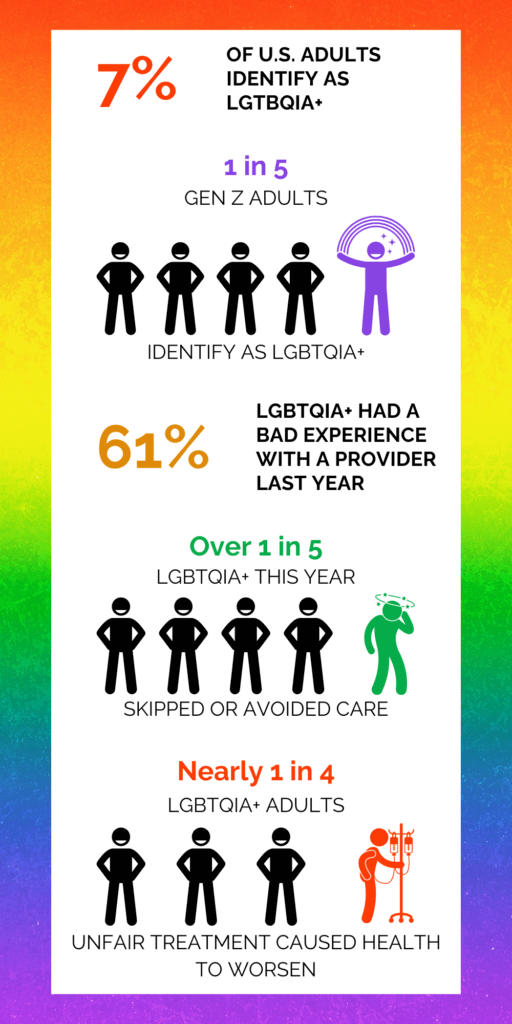The LGBTQIA+ community is a growing healthcare audience. According to Gallup, over 7.1% of the American population identify as LGBTQIA+ and a remarkable 20% of Gen Z’ers aged 18-26 (Gallup 2024). Yet patients continue to face significant barriers and discrimination when seeking healthcare. Members of the queer community are “more likely to experience delays in diagnosis due to a lack of access to health care, fear of disclosing their sexuality or gender, and discrimination” (Keep a Breast 2024) A recent survey found that 61% of LGBTQIA+ adults reported negative experiences with healthcare providers, compared to just 31% of non-LGBTQIA+ adults (KFF 2024). As healthcare marketers, we can move the dial by promoting inclusive messaging and imagery in our campaigns to make LGBTQIA+ patients feel safe, welcome and understood when seeking care.
In honor of PRIDE month, we want to represent our LGBTQIA+ members, patients, and healthcare workers by sharing some key data we’ve sourced from the Kaiser Family Foundation (KFF 2024), a report from the Center for American Progress on Discrimination and Barriers to Wellbeing (CAP 2023), and Cultural Competence in the Care of LGBTQ Patients (NIH 2023).
In case you are not current on the acronym, LGBTQIA+ stands for lesbian, gay, bisexual, transgender, queer/questioning, intersex, and asexual. The plus is for other identities that should be included.

Navigating Patient-Doctor Challenges for LGBTQIA+ Patients (NIH 2023)
The LGBTQIA+ community is diverse, spanning all races, ethnicities, religions and socioeconomic backgrounds. (Stigmas can be higher for people in traditionally homophobic cultures.)
LGBTQIA+ patients face health disparities including higher rates of depression, anxiety, substance abuse, and some cancers
Openly discussing sexual health related issues may be especially difficult, and sometimes implicit biases affect healthcare practitioners decisions
Healthcare practitioners commonly fail to be sensitive or show discomfort in addressing non-cisgender sexuality, sexual acts, or complications specific to the LGBTQIA+ community
LGBTQIA+ people are at higher risk for healthcare barriers, including homelessness, medical trauma, and depression
Patients may be reluctant to share LGBTQIA+ related information, concerns, or medications (especially illicit), like hormone usage
High Disparity in Healthcare Experiences for LGBTQIA+ (KFF 2024)
-
LGBTQIA+ adults face higher rates of discrimination than non-LGBTQIA+ adults. 65% of LGBTQIA+ adults vs. 40% of non-LGBTQIA+ adults experienced discrimination in daily life in the past year.
-
LGBTQIA+ adults are twice as likely as non-LGBTQIA+ adults to report negative experiences with healthcare providers, including unfair treatment, providers making assumptions, and ignoring questions (61% vs. 31%).
-
LGBTQIA+ adults are over 2x more likely than non-LGBTQIA+ adults to say unfair treatment caused their health to get worse (24% vs. 9%) or made them less likely to seek care (39% vs. 15%).
-
39% of LGBTQIA+ adults describe their mental health as “fair” or “poor” vs. 16% of non-LGBTQIA+ adults. Over half of young and lower-income LGBTQIA+ adults report poor mental health.
-
44% of LGBTQIA+ adults vs. 19% of non-LGBTQIA+ adults say they or a family member experienced a severe mental health crisis resulting in consequences like homelessness or self-harm.
-
22% of LGBTQIA+ adults have experienced homelessness, twice the rate of non-LGBTQIA+ adults. This rises to 35% for Black LGBTQIA+ adults and 39% for lower-income LGBTQIA+ adults.
The Impact on LGBTQIA+ Health Journeys (CAP 2023)
Housing insecurity affects over 30% of LGBTQIA+ people due to discrimination or harassment
1 in 3 LGBTQIA+ adults skipped or postponed medical care due to cost concerns in the past year
1 in 3 LGBTQIA+ adults reported negative experiences with mental health professionals in the past year, with significantly higher rates among LGBTQIA+ people of color and transgender people.
23% LGBTQI+ patients delayed or avoided necessary medical care in the past year due to disrespect or discrimination from a doctor or other health care provider–3 times the rate of non-LGTBQIA+
Many fear denial of or diminished quality of care if healthcare providers know their sexual orientation or gender identity.
Check-In with Inclusive Healthcare Engagement
The American Medical Association recommends three key ways healthcare providers can create a more affirming environment for LGBTQIA+ patients (AMA 2023):
Use affirmational terminology. Listen to the words patients use to describe themselves and reflect that language. Stay up-to-date on evolving terminology.
Think beyond the gender binary. Recognize gender as a spectrum. Offer gender-neutral bathrooms and use inclusive language in content, forms, and personalized messaging.
Stay updated on LGBTQIA+ health issues and disparities. Be aware of the unique mental and physical health risks LGBTQIA+ patients face so you can provide appropriate screening and support.

Key Takeaways for Healthcare Marketers
-
Partner with LGBTQIA+ health centers and community organizations to ensure marketing is inclusive and reaches these populations. This could involve collaborating on targeted social media campaigns, sponsoring LGBTQIA+ health events, or featuring LGBTQIA+ individuals and their stories in marketing materials.
-
Represent the diversity of the LGBTQIA+ community in marketing visuals. Go beyond stereotypes.
-
Use inclusive, gender-neutral language in marketing copy. Allow for LGBTQIA+ terminology and use the terms/pronouns preferred by each individual patient. Forms and personalized content should include options like “partner” in addition to “spouse.”
-
Educate providers you work with on LGBTQIA+ health disparities so they can properly screen patients. Provide content to help.
-
If marketing gender-affirming care, focus on how it improves mental health and quality of life for transgender people. Combat stereotypes.
-
Create inclusive health content for provider offices, hospitals, pharmacies to signal LGBTQIA+ cultural competence. Focus on specific health needs of LGBTQIA+ people. This might, for example, include featuring LGBTQIA+ couples in family planning or women’s health points of care.
-
Encourage practices to signal LGBTQIA+ cultural competence through inclusive forms, staff training, etc. Provide resources to help.
-
Share the AMA’s three key recommendations with providers to help them create more LGBTQIA+-affirming care environments.
PRIDE in Changing the Point of Care
LGTBQIA+ Disparity is a Matter of Fact (Infographic)
By implementing these best practices and partnering with LGBTQIA+ organizations, we can help make healthcare more welcoming and accessible to LGBTQIA+ individuals. Discrimination and fear of negative experiences have real impacts on the health of this community, especially for LGBTQIA+ people of color and those with lower incomes. As marketers, we have the power and responsibility to reduce health disparities, improve patient outcomes, and ultimately, save lives. As we celebrate PRIDE month, let us join together in our commitment to promoting health equity and inclusion for all.
Happy PRIDE! 🏳️🌈 We encourage everyone to read the full articles:

